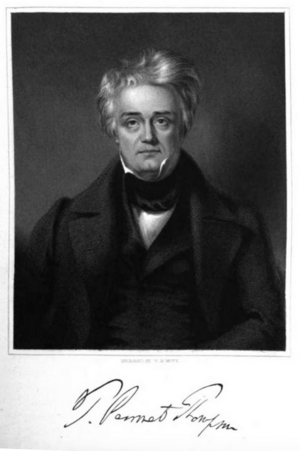Thomas Perronet Thompson facts for kids

Thomas Perronet Thompson (born March 15, 1783 – died September 6, 1869) was an important British figure. He was a politician who helped make laws, and he also served as a governor in Sierra Leone, a country in West Africa. He was known as a "radical reformer," meaning he wanted big changes to make society fairer.
In the 1830s and 1840s, he became famous as a leader in the Anti-Corn Law League. This group worked to stop unfair taxes on imported food called "Corn Laws." Thomas Thompson was very good at getting people to support his ideas. He did this by writing many pamphlets (small booklets), newspaper articles, and letters. He also gave speeches and organized countless local meetings to plan their actions.
Contents
Biography
Thomas Thompson was born in Kingston upon Hull, England, in March 1783. His father, also named Thomas Thompson, was a banker. His mother was Philothea Perronet Briggs. The name Perronet came from his mother's grandfather, Vincent Perronet, who was a vicar (a type of priest) and a friend of the famous John and Charles Wesley.
Early Life and Education
Thomas went to Hull Grammar School. Later, in 1802, he graduated from Queens' College, Cambridge, where he was a very good student in mathematics.
Military and Governor Roles
In 1803, Thompson joined the Royal Navy as a midshipman (a junior officer). Then, in 1806, he switched to the British Army as a lieutenant. From 1808 to 1810, he became the Governor of Sierra Leone. He got this job partly because he knew William Wilberforce, a famous person who fought against slavery.
However, Thompson was removed from his job because he complained about how "freed" slaves were treated. They were forced to work as "apprentices" for 14 years, which he felt was like slavery. He even said that Wilberforce and the Sierra Leone Company were acting like "slave traders themselves." Because he threatened to tell everyone about this, he was fired.
In 1812, Thompson went back to his military duties. He served in France. In 1815, he became an Arabic interpreter for a group going to the Persian Gulf. There, he helped make a treaty (an agreement) in 1820. This treaty was important because it was the first time the slave trade was officially called "piracy" (a crime like robbery at sea).
While in the Army, Thompson continued to rise through the ranks. He became a major in 1825 and a lieutenant colonel in 1829. Later in his life, he was made a major general, which is a very high rank. His second son, Charles, was born in India while Thompson was serving there.
Political and Writing Career
As a "radical reformer," Thompson wrote many important books and articles. These included True Theory of Rent and A Catechism on the Corn Laws. For a time, he also partly owned the Westminster Review, a well-known journal. He wrote many articles for this journal, supporting the idea of universal suffrage, which means everyone having the right to vote. His articles were later collected and published in six volumes in 1842.
Thompson served as a Member of Parliament in the House of Commons. He represented Kingston upon Hull from 1835 to 1837. He also represented Bradford from 1847 to 1852, and again from 1857 to 1859.
Thomas Thompson passed away in September 1869 at the age of 86. There are monuments (memorials) to his sons, General Charles William Thompson and Lieutenant Colonel John Wycliffe Thompson, in a church near Hull. His youngest daughter, Anne Elise, also has a monument there.
Personal Life
Thomas Thompson had an interest in music. He wrote books about music theory, including one for playing the guitar. He also had some unique ideas about mathematics. He published a book called Theory of Parallels in 1844. He also wrote Geometry without Axioms, where he tried to explain geometry without using basic rules called axioms.
Thompson was also known for his personal habits. He was a vegetarian, meaning he did not eat meat.
 | Jackie Robinson |
 | Jack Johnson |
 | Althea Gibson |
 | Arthur Ashe |
 | Muhammad Ali |

